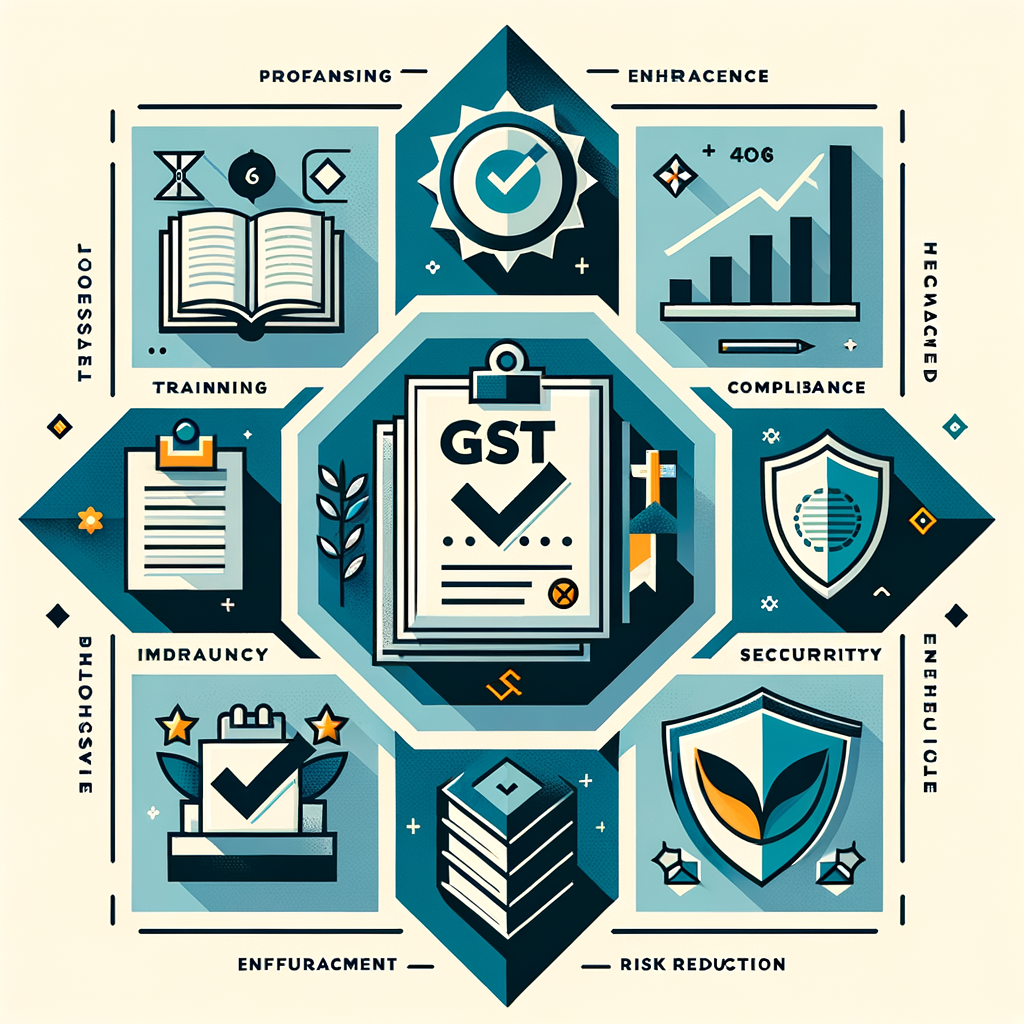The Essential Role of Professional Training in GST Compliance | TaxRobo
Navigating India’s Goods and Services Tax (GST) can feel like solving a complex puzzle with ever-changing pieces. For small business owners and finance professionals, staying on top of frequent updates, complex return filing procedures, and the severe penalties for non-compliance is a significant challenge. This is where the importance of professional training in GST becomes clear. Investing in effective professional training GST compliance is no longer a luxury but a fundamental necessity for sustainable business growth and financial stability. This comprehensive guide will explore the persistent challenges of GST, demonstrate how targeted training provides the solution, and help you choose the right program to empower your team.
Why is GST Compliance a Constant Challenge for Indian Businesses?
Before we can appreciate the solution, we must understand the depth of the problem. GST was a landmark reform, but its implementation has brought several hurdles for businesses, making compliance a continuous and demanding process. These challenges, which illustrate The Impact of GST on Small and Medium Enterprises, underscore the need for ongoing education and professional development. From a constantly evolving legal framework to the technicalities of documentation, mastering GST requires dedicated effort and expert guidance.
The Dynamic Nature of GST Law
The GST framework is not static. The GST Council meets regularly, and with each meeting comes a new set of recommendations, leading to frequent amendments, changes in tax rates, and new notifications. These changes can affect everything from tax liability on specific goods to the procedures for filing returns. For a busy business owner, keeping track of every circular and press release is nearly impossible. This constant flux means that knowledge acquired a year ago might already be outdated. Staying current requires a proactive approach, and a great starting point is to bookmark the official Central Board of Indirect Taxes and Customs (CBIC) website to access the latest circulars and notifications directly.
Complexities in Invoicing and Record-Keeping
Proper GST compliance begins at the very first step: invoicing. The rules are highly specific and technical, demanding meticulous attention to detail. Businesses must correctly identify and apply HSN (Harmonized System of Nomenclature) or SAC (Services Accounting Code) for every good or service. Furthermore, the implementation of e-invoicing for businesses above a certain turnover threshold has added another layer of technical procedure. Mistakes in invoicing, such as incorrect GSTINs, wrong tax rates, or failure to meet e-invoicing norms, can lead to disputes with clients and rejection of Input Tax Credit (ITC). Similarly, issuing credit and debit notes has its own set of prescribed rules that must be followed. Proper GST compliance training for businesses covers these practical aspects in detail, ensuring your team can generate accurate documents every time.
The High Cost of Non-Compliance
The consequences of GST errors are not trivial; they can have a severe financial and reputational impact on a business. Ignorance of the law is not considered a valid excuse, and even unintentional mistakes can attract significant repercussions. Understanding these risks is crucial for appreciating the value of investing in compliance. The potential costs include:
- Hefty Penalties and Late Fees: The GST Act prescribes substantial penalties for various offenses, from incorrect filing to tax evasion. Late filing of returns attracts daily late fees, which can accumulate rapidly.
- Interest on Delayed Tax Payments: If you fail to pay the required GST by the due date, you are liable to pay interest on the outstanding amount, adding a significant financial burden.
- Potential for Tax Notices and Audits: Frequent errors or discrepancies in your returns can flag your business for scrutiny from tax authorities, leading to time-consuming audits and legal proceedings.
- Loss of Input Tax Credit (ITC): One of the biggest financial blows is the loss of ITC due to compliance failures by either you or your supplier. This directly increases your tax outgo and hurts your bottom line.
- Damage to Business Reputation: Consistent non-compliance can damage your credibility with customers, suppliers, and financial institutions, making it harder to conduct business smoothly.
Bridging the Gap: How Professional Training for GST Compliance Helps
The challenges of GST—its dynamic nature, technical complexity, and the high stakes of non-compliance—create a significant knowledge gap for many businesses. This is precisely the gap that professional training is designed to fill. By investing in a structured learning program, businesses can transform GST from a source of stress into a manageable and streamlined process. It’s about empowering your team with the knowledge, skills, and confidence to navigate the tax landscape effectively.
Building a Strong Foundational Understanding
A high-quality training program provides a comprehensive learning path, starting from the basics and progressing to more advanced, practical applications. It demystifies the entire GST ecosystem and equips participants with the skills needed for day-to-day operations. Key areas covered in effective training include:
- Core Concepts: A clear explanation of the dual GST model, including the roles of CGST, SGST, and IGST. It also covers special provisions like the Composition Scheme for small taxpayers.
- Practical Skills: Step-by-step, hands-on guidance on filing various returns like GSTR-1 (outward supplies), GSTR-3B (summary return), and GSTR-9 (annual return). Our detailed guide, How to File GST Returns Online: A Step-by-Step Guide of the GST Filing Process & Procedure, covers this process extensively.
- Critical Areas: A deep dive into the rules governing Input Tax Credit (ITC), which is the backbone of GST. This includes understanding eligibility, blocked credits, and the crucial process of reconciling purchase data with GSTR-2A and GSTR-2B. It is also important to have a firm grasp of Understanding Input Tax Credit Reversals and Their Role in GST Demand Notices.
- Logistics: Comprehensive training on the E-way bill system, which is mandatory for the movement of goods exceeding a specific value, ensuring your supply chain remains compliant.
The Tangible Benefits of Training for GST Compliance
Investing in training is not an expense; it is a strategic investment that yields measurable returns. The benefits of training for GST compliance extend beyond just knowledge acquisition and have a direct, positive impact on a company’s financial health and operational efficiency. When your team is well-versed in GST law and procedures, the entire business benefits from a culture of compliance and accuracy.
- Error Reduction: A well-trained team is far less likely to make costly mistakes in tax calculation, invoicing, or return filing. This proactive approach significantly minimizes the risk of receiving tax notices and facing penalties.
- Optimized Cash Flow: The most critical financial benefit comes from mastering Input Tax Credit. Correctly and promptly claiming all eligible ITC improves your working capital and reduces your actual tax payment, directly boosting your cash flow.
- Increased Efficiency: Knowledgeable employees can handle GST-related tasks faster and more accurately. This streamlines your accounting and filing processes, freeing up valuable time and resources that can be dedicated to core business activities.
- Boosted Confidence: Training empowers business owners and staff to manage GST matters with confidence. This sense of competence fosters professional development for GST compliance, reducing dependency on external consultants for every minor issue and enabling quicker decision-making.
Choosing the Right GST Compliance Training Program in India
With a clear understanding of why training is essential, the next step is to select the right program. The market is filled with various options, and choosing the one that best fits your needs is crucial for maximizing your return on investment. The best GST compliance training programs India offers are those that combine theoretical knowledge with practical, real-world application.
What to Look for in GST Training Courses for Professionals
When evaluating different GST training courses for professionals, it’s important to look beyond the marketing claims and assess the substance of the program. A great course will equip you with actionable skills, not just theoretical knowledge. Use this checklist to make an informed decision:
- Updated Curriculum: The GST law is constantly evolving. Does the course content cover the latest amendments from the GST Council and recent budget changes? An outdated curriculum is of little practical use.
- Practical Focus: Does the training go beyond PowerPoint slides? Look for programs that include practical case studies, hands-on exercises, and live demonstrations of filing returns on the official GST Portal.
- Expert Instructors: Who is teaching the course? The best instructors are seasoned Chartered Accountants, tax lawyers, or industry professionals with years of hands-on experience in handling GST matters.
- Post-Training Support: Learning doesn’t stop when the course ends. Does the provider offer a support system, such as a community forum or email support, for clarifying doubts that may arise after you complete the training?
Online vs. In-Person: Which GST Compliance Workshop in India is for You?
Training programs are available in different formats, each with its own set of advantages. The right choice depends on your learning style, schedule, and specific needs. Many providers now offer both online courses and interactive GST compliance workshops in India.
| Format | Pros | Cons |
|---|---|---|
| Online Courses | – Highly flexible and self-paced. – Accessible from anywhere. – Often more affordable. |
– Requires self-discipline. – Less direct interaction with instructors. |
| In-Person Workshops | – Highly interactive with immediate doubt clarification. – Excellent networking opportunities. – Structured, focused learning environment. |
– Less flexible scheduling. – May involve travel costs. – Generally more expensive. |
Ultimately, whether you choose an online course or an in-person workshop, ensure it meets the criteria of having an updated curriculum, a practical focus, and expert instructors.
Conclusion
The complexity of India’s GST regime is an undeniable reality for every business. However, it is not an insurmountable obstacle. Enhancing GST compliance through training is the most effective and strategic way to navigate this landscape. It is a proactive investment that protects your business from significant financial risks, optimizes cash flow by ensuring proper ITC claims, and boosts operational efficiency. By empowering yourself and your team with the right knowledge, you can turn a daunting legal obligation into a streamlined and manageable business process. Proactive professional training GST compliance is the key to achieving not just compliance, but confidence and control over your business’s financial health.
Don’t let GST complexities hold your business back. If you need expert assistance with GST filing, registration, or compliance, contact the specialists at TaxRobo today for a hassle-free experience.
Frequently Asked Questions (FAQs)
1. Who should attend GST compliance training?
GST training is beneficial for a wide range of individuals. This includes small business owners, accountants, finance managers, tax consultants, and even commerce students looking to build a career in finance. Essentially, anyone who is directly or indirectly responsible for the financial and tax operations of a business will find it immensely valuable.
2. How often do I need to update my GST knowledge?
Given the dynamic nature of GST law in India, with frequent amendments and clarifications from the GST Council, it is highly advisable to refresh your knowledge periodically. Attending a refresher course, a webinar on recent updates, or a workshop at least once a year is a good practice to ensure your compliance methods remain current.
3. Is online GST training as effective as in-person training?
Yes, online training can be just as effective, provided it is well-structured. High-quality online courses today offer interactive elements like live Q&A sessions with instructors, practical simulations of working on the GST portal, and access to recorded sessions for revision. This makes them a highly flexible and powerful learning option for busy professionals who cannot commit to a fixed in-person schedule.
4. Can I just learn from the official GST portal instead of taking a course?
While the official GST Portal is an excellent and authoritative resource for information, rules, and circulars, it does not provide guided learning. A structured training program offers context, practical insights from industry experts, and explains how to apply complex rules to real-world business scenarios. A course helps you connect the dots and understand the practical implications of the law, which can be very difficult to grasp by simply reading the material on your own.



